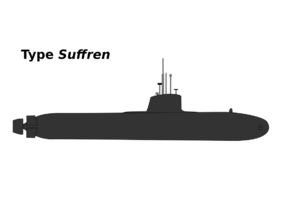Engineering:French Barracuda-class submarine
 Profile of the Barracuda type, with her pump-jet propeller and X-shaped stern planes.
| |
| Class overview | |
|---|---|
| Name: | Barracuda class |
| Builders: | DCNS |
| Operators: |
|
| Preceded by: | Rubis class |
| Cost: | |
| Built: | Since 2007 |
| In commission: | 2018, planned (originally 2017) |
| Planned: | 6 |
| Building: | 3 |
| Completed: | 0 |
| General characteristics | |
| Type: | Nuclear attack submarine |
| Displacement: |
|
| Length: | 99.5 m (326 ft) |
| Beam: | 8.8 m (29 ft) |
| Draught: | 7.3 m (24 ft) |
| Propulsion: |
|
| Speed: |
|
| Range: | Unlimited range, 10 years (nuclear fuel) |
| Endurance: | 70 days of food [2] |
| Complement: |
|
| Sensors and processing systems: |
|
| Armament: | |
The Barracuda class (or Suffren class) is a new nuclear attack submarine, designed by the French shipbuilder DCNS for the French Navy, replacing the Rubis-class submarines. Construction began in 2007 and the first unit will be commissioned in 2018.
Barracudas will use technology from the Triomphant class, including pump-jet propulsion. This class reportedly produces approximately 1/1000 of the detectable noise of the Redoutable-class boats (submarines), and they are ten times more sensitive in detecting other submarines.[5] They will be fitted with torpedo-tube-launched cruise missiles MDCN SCALP Naval for long-range (well above 1,000 km, 620 mi) strikes against strategic land targets. Their missions will include anti-surface and anti-submarine warfare, land attack, intelligence gathering, crisis management and special operations.
History
In October 1998, the Delegation Générale pour l'Armement, the French government's defense procurement agency, established an integrated project team consisting of the Naval Staff, DCN, Technicatome and the Commissariat a l'Énergie Atomique, a regulatory body that oversees nuclear power plants, to oversee the design of a new attack submarine class.[6] DCN was to be the boat's designer and builder while Technicatome, since absorbed Areva company, was to be responsible for the nuclear power plant. The two companies were to act jointly as a single prime contractor to share the industrial risks, manage the schedules, and be responsible for the design's performance and costs, which at the time was estimated to be US$4.9 billion.[6]
According to the contract signed in December 2006, the first boat was to commence sea trials in early 2016, with delivery occurring in late 2016/early 2017. This was to be followed by entry into service in late 2017.[7]
As of early 2016, the first new Barracuda-class submarine, Suffren will start sea trials in spring 2017, with delivery anticipated in late 2017 and commissioning into service in 2018.
DCNS also designed a conventionally powered derivative, dubbed the SMX-Ocean, featuring fuel-cells and vertical launchers.[8]
Another conventionally powered design, the Shortfin Barracuda, was selected as a future replacement for the Collins-class vessels with the Royal Australian Navy.[9]
In 2016, DCNS also began to position itself and its Suffren/SMX Ocean design in the Royal Canadian Navy's Future Canadian Submarines project. The project is planned to replace the Victoria-class submarines by 2030.[10]
Description
The Barracuda class nuclear reactor incorporates several improvements over that of the preceding Rubis. Notably, it extends the time between refuelling and complex overhauls (RCOHs) from 7 to 10 years, enabling higher at-sea availability.
In support of special operations missions, Barracudas may also accommodate up to 12 commandos, while carrying their equipment in a mobile pod attached aft of the sail.[2]
On 22 December 2006, the French government placed a €7.9 billion order for six Barracuda submarines with DCNS and their nuclear powerplants with Areva-Technicatome.[11] According to the DGA “Competition at the subcontractor level will be open to foreign companies for the first time.”[12] The first submarine will be delivered in 2016. Alain Aupetit, DCNS's Barracuda programme director, said "The gap between the delivery of boats one and two will be two-and-a-half years.... After that, we will deliver one boat every two years through to the delivery of the last submarine in 2026."
Boats
| Pennant no. | Name | Laid down | Launched | Commissioned | Homeport |
|---|---|---|---|---|---|
| Suffren | 19 December 2007 | Expected in 2018 | Expected in 2019 | Toulon | |
| Duguay-Trouin | 26 June 2009 | Expected in 2020[1] | Toulon | ||
| Tourville | 28 June 2011 | Expected in 2022[1] | Toulon | ||
| Dupetit-Thouars[13] | Expected in 2025 | Toulon | |||
| Duquesne[13] | Expected in 2027 | Toulon | |||
| De Grasse[13] | Expected in 2029 | Toulon |
Shortfin Barracuda conventional variant

| |
| Class overview | |
|---|---|
| Name: | Shortfin Barracuda Block 1A |
| Builders: | DCNS |
| Operators: |
|
| Preceded by: | Collins class |
| In commission: | Approx. 2030–2070 (planned) |
| Planned: | 12 |
| Building: | 0 |
| Completed: | 0 |
| General characteristics | |
| Type: | Diesel-electric attack submarine |
| Displacement: | over 4,000 t submerged |
| Length: | 97 m (318 ft) |
| Propulsion: |
|
| Range: | 18,000 nm |
| Endurance: | 90 days submerged |
| Complement: | 60+12 special forces |
| Armament: |
8 533mm torpedo tubes Payload: 28 torpedoes mix of: Mk 48 torpedoes, Harpoon anti-ship missiles or Mk III Stonefish mines |
DCNS submitted a conventionally powered diesel-electric variation to the design – named the Shortfin Barracuda Block 1A – to the competitive evaluation process (CEP) phase of Australia Collins-class submarine replacement. "While exact details remain confidential, DCNS can confirm the Shortfin Barracuda is over 90 metres in length and displaces more than 4,000 tons when dived," said Sean Costello, CEO DCNS Australia.[14] DCNS was chosen by the Australian Government on 26 April 2016 to build twelve of the Shortfin Barracuda Block 1A variant at a projected AUD$50 billion. Much of the works will be undertaken at ASC Pty Ltd in Adelaide, South Australia.[15][16] Construction is expected to begin in 2020 or 2021.[17]
See also
- List of submarines of France
- Submarine forces (France)
- Future of the French Navy
- Cruise missile submarine
- Attack submarine
References
- ↑ 1.0 1.1 1.2 1.3 "Projet de loi de finances pour 2014 : Défense : équipement des forces et excellence technologique des industries de défense" (in French). Senate of France. 21 November 2013. http://www.senat.fr/rap/a13-158-8/a13-158-813.html#toc178. Retrieved 2014-07-02.
- ↑ 2.0 2.1 "France’s Future SSNs: The Barracuda Class". Defense Industry Daily. 28 October 2014. http://www.defenseindustrydaily.com/frances-future-ssns-the-barracuda-class-02902/. Retrieved 22 November 2014.
- ↑ "Nouvelle génération de torpille lourde pour la Marine nationale : la F21". DCNS. October 2008. Archived from the original on November 12, 2008. https://web.archive.org/web/20081112193412/http://www.dcnsgroup.com/files/naval_expert/fr_bd.pdf. Retrieved 20 May 2010.
- ↑ Vavasseur, Xavier (8 February 2015). "Exclusive Interview With The French Navy On The Barracuda SSN Program". navy-recognition.com. http://www.navyrecognition.com/index.php?option=com_content&task=view&id=2399. Retrieved 1 July 2015.
- ↑ "SNLE-NG Le Triomphant". netmarine.net. Archived from the original on 21 May 2014. https://web.archive.org/web/20140521212804/http://www.netmarine.net/bat/smarins/triompha/index.htm. Retrieved 22 November 2014.
- ↑ 6.0 6.1 Preston, Antony (1 October 2002). "France unveils plans for new barracuda SSNs". Sea Power. http://www.highbeam.com/doc/1P3-209601821.html. Retrieved 18 May 2015.
- ↑ "Les noms des futurs sous-marins nucléaires français dévoilés". 2007-05-28. http://www.meretmarine.com/fr/content/les-noms-des-futurs-sous-marins-nucleaires-francais-devoiles.
- ↑ "SMX® Ocean Conventionally Powered Attack Submarine, France". http://www.naval-technology.com/projects/smx-ocean-conventionally-powered-attack-submarine/. Retrieved 16 September 2015.
- ↑ Scott, Jason; Whitley, Angus. "France's DCNS Wins $39 Billion Australian Submarine Contract". Bloomberg L.P.. https://www.bloomberg.com/news/articles/2016-04-26/france-wins-39-billion-contract-to-build-australian-submarines. Retrieved 26 April 2016.
- ↑ "DCNS : La nouvelle FREMM ER dévoilée à Ottawa". meretmarine.com. 27 May 2016. http://meretmarine.com/fr/content/dcns-la-nouvelle-fremm-er-devoilee-ottawa. Retrieved 18 February 2017.
- ↑ "France orders six 'Barracuda' class nuclear-driven submarines". Agence France Presse. 2006-12-22.
- ↑ Navy League of the United States - Citizens in Support of the Sea Services
- ↑ 13.0 13.1 13.2 "Programme Barracuda : mer en vue pour le Suffren" (in French). Ministry of Defence of France. 23 July 2013. http://www.defense.gouv.fr/marine/magazine/traque-en-eaux-profondes/programme-barracuda-mer-en-vue-pour-le-suffren. Retrieved 2015-08-13.
- ↑ "DCNS unveils Shortfin Barracuda" (Press release). DCNS. 15 July 2015. Retrieved 20 October 2015.
- ↑ "France wins $50b contract to help build Australia's new submarines" (Press release). Retrieved 26 April 2016.
- ↑ Starick, Paul (2016-04-26). "$50bn Future Submarines to be built at Osborne in Adelaide by French firm DCNS". The Advertiser. http://www.adelaidenow.com.au/news/south-australia/pm-malcolm-turnbull-on-50bn-future-submarines-project/news-story/be2a8da55f6066ba070454d667729c04.
- ↑ "Submarine project boosts France-Australia ties". AAP. 9 July 2017. https://www.sbs.com.au/news/article/2017/07/09/submarine-project-boosts-france-australia-ties. Retrieved 10 July 2017.
External links
- France’s Future SSNs: The Barracuda Class at Defense Industry Daily.

